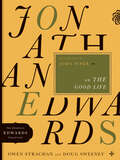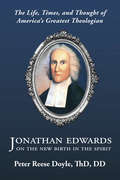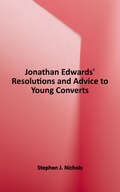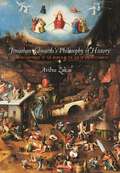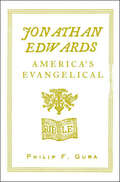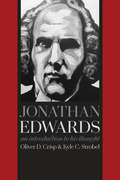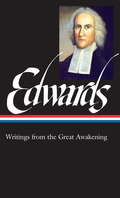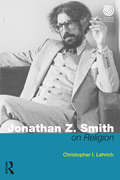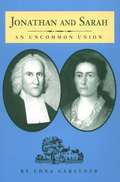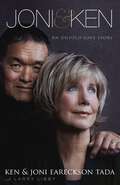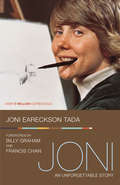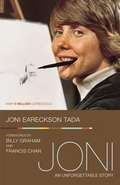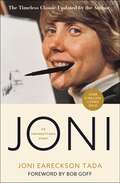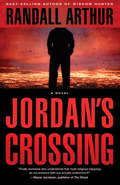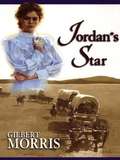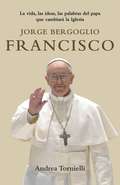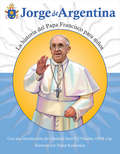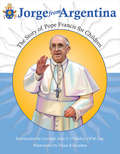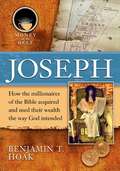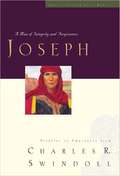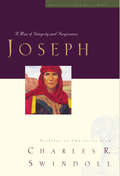- Table View
- List View
Jonathan Edwards on the Good Life (The Essential Edwards Collection #3)
by Owen Strachan Douglas Allen SweeneyWhat is the good life that we so often hear talk of in our modern age?Is it cars that drive fast, houses that resemble castles? Is it unbounded sexual pleasure, unrestrained personal gratification of all one&’s desires? Is it quiet and solitude, individual removal from the storm and thunder of modern society? Or is it obedient Christian faith that causes spiritual corpses to burst forth with godly passion and holy worship that transforms one&’s own life, one&’s environment, and one&’s eternal destiny?This other way of life proceeds from an ancient book that lifts life in this age and all mothers to another plane. This is the truly good life, the path plotted for the steps of mankind by almighty God. It involves sacrifice, and hardship, and hard work. It means self-denial, self-abasement, and an others-centered mindset. It is radically God-centered and deeply rooted in Scripture. This, and no other path, offers the souls of humanity lasting happiness. For Jonathan Edwards, submission to God and His will was the path to true fulfillment and the good life. Easily accessible and readable, you do not need to be a scholar to enjoy these insights about Jonathan Edwards and his writings.
Jonathan Edwards on the Good Life (The Essential Edwards Collection #3)
by Owen Strachan Douglas Allen SweeneyWhat is the good life that we so often hear talk of in our modern age?Is it cars that drive fast, houses that resemble castles? Is it unbounded sexual pleasure, unrestrained personal gratification of all one&’s desires? Is it quiet and solitude, individual removal from the storm and thunder of modern society? Or is it obedient Christian faith that causes spiritual corpses to burst forth with godly passion and holy worship that transforms one&’s own life, one&’s environment, and one&’s eternal destiny?This other way of life proceeds from an ancient book that lifts life in this age and all mothers to another plane. This is the truly good life, the path plotted for the steps of mankind by almighty God. It involves sacrifice, and hardship, and hard work. It means self-denial, self-abasement, and an others-centered mindset. It is radically God-centered and deeply rooted in Scripture. This, and no other path, offers the souls of humanity lasting happiness. For Jonathan Edwards, submission to God and His will was the path to true fulfillment and the good life. Easily accessible and readable, you do not need to be a scholar to enjoy these insights about Jonathan Edwards and his writings.
Jonathan Edwards on the New Birth in the Spirit: The Life, Times, and Thought of America’s Greatest Theologian
by Brandon J. B20 Cozart Peter Reese DoyleBiblical truth in the hands of Edwards lives mightily. Edwards in the hand of Peter Doyle comes alive. As we see an anemic Christendom today in its witness, ethics, and influence, we find the correctives and the guidance we need in the works of Jonathan Edwards––revivalist preacher, philosopher, and theologian. In this insightful book, former pastor and missionary Peter Doyle presents Edwards’ theology in a comprehensive scope: in its cultural context, against its adversaries, and with all its practical and pastoral implications. Doyle paints for readers a clear picture of how Edwards understands the ‘new birth.’ A cursory treatment of being born again this is not. The great revivals under Edwards’ preaching gave to the converts a sense of the glory of God, their own sinfulness, and a humility before the sacrifice of Christ for their sin.
Jonathan Edwards' Resolutions and Advice To Young Converts
by Jonathan EdwardsWhile completing his preparation for the ministry, Jonathan Edwards wrote seventy resolutions that guided him throughout his life. About twenty years later he wrote a letter to young Deborah Hatheway, a new convert in a nearby town, advising her concerning the Christian life. <p><p>These two writings, often reprinted during the eighteenth and nineteenth centuries, overflow with straightforward and biblically sound advice. This advice is as current today as it was in the 1700s, and it far surpasses the how-to books now overrunning bookstores.
Jonathan Edwards's Philosophy of History: The Reenchantment of the World in the Age of Enlightenment
by Avihu ZakaiAvihu Zakai analyzes Jonathan Edwards's redemptive mode of historical thought in the context of the Enlightenment. As theologian and philosopher, Edwards has long been a towering figure in American intellectual history. Nevertheless, and despite Edwards's intense engagement with the nature of time and the meaning of history, there has been no serious attempt to explore his philosophy of history. Offering the first such exploration, Zakai considers Edwards's historical thought as a reaction, in part, to the varieties of Enlightenment historical narratives and their growing disregard for theistic considerations. Zakai analyzes the ideological origins of Edwards's insistence that the process of history depends solely on God's redemptive activity in time as manifested in a series of revivals throughout history, reading this doctrine as an answer to the threat posed to the Christian theological teleology of history by the early modern emergence of a secular conception of history and the modern legitimation of historical time. In response to the Enlightenment refashioning of secular, historical time and its growing emphasis on human agency, Edwards strove to re-establish God's preeminence within the order of time. Against the de-Christianization of history and removal of divine power from the historical process, he sought to re-enthrone God as the author and lord of history--and thus to re-enchant the historical world. Placing Edwards's historical thought in its broadest context, this book will be welcomed by those who study early modern history, American history, or religious culture and experience in America.
Jonathan Edwards: A Life
by George M. MarsdenJonathan Edwards (1703-1758) is a towering figure in American history. A controversial theologian and the author of the famous sermon Sinners in the Hands of an Angry God, he ignited the momentous Great Awakening of the eighteenth century. In this definitive and long-awaited biography, Jonathan Edwards emerges as both a great American and a brilliant Christian. George Marsden evokes the world of colonial New England in which Edwards was reared-a frontier civilization at the center of a conflict between Native Americans, French Catholics, and English Protestants. Drawing on newly available sources, Marsden demonstrates how these cultural and religious battles shaped Edwards's life and thought. Marsden reveals Edwards as a complex thinker and human being who struggled to reconcile his Puritan heritage with the secular, modern world emerging out of the Enlightenment. In this, Edwards's life anticipated the deep contradictions of our American culture. Meticulously researched and beautifully composed, this biography offers a compelling portrait of an eminent American.
Jonathan Edwards: America's Evangelical
by Philip F. GuraAn important new biography of America's founding religious father. Jonathan Edwards was America's most influential evangelical, whose revivals of the 1730s became those against which all subsequent ones have been judged.The marvelous accomplishment of Philip Gura's Jonathan Edwards is to place the rich intellectual landscape of America's most formidable evangelical within the upheaval of his times. Gura not only captures Edwards' brilliance but respectfully explains the enduring appeal of his theology: in a world of profound uncertainty, it held out hope of an authentic conversion---the quickening of the indwelling spirit of God in one's heart and the consequent certitude of Godly behavior and everlasting grace. Tracing Jonathan Edwards' life from his birth in 1703 to his untimely death in 1758, Gura magnificently reasserts Edwards rightful claim as the father of America's evangelical tradition.
Jonathan Edwards: An Introduction to His Thought
by Oliver D. Crisp Kyle C. StrobelStudent-friendly intro to one of America&’s most fascinating theological minds Jonathan Edwards (1703–1758) has long been recognized as one of the preeminent thinkers in the early Enlightenment and a major figure in the history of American Christianity. In this accessible one-volume text, leading Edwards experts Oliver Crisp and Kyle Strobel introduce readers to the fascinating and formidable mind of Jonathan Edwards as they survey key theological and philosophical themes in his thought, including his doctrine of the Trinity, his philosophical theology of God and creation, and his understanding of the atonement and salvation. More than two centuries after his death, theologians and historians alike are finding the larger-than-life Edwards more interesting than ever. Crisp and Strobel&’s concise yet comprehensive guide will help students of this influential eighteenth-century revivalist preacher to understand why.
Jonathan Edwards: An Introduction to His Thought
by Oliver D. Crisp Kyle C. StrobelStudent-friendly intro to one of America&’s most fascinating theological minds Jonathan Edwards (1703–1758) has long been recognized as one of the preeminent thinkers in the early Enlightenment and a major figure in the history of American Christianity. In this accessible one-volume text, leading Edwards experts Oliver Crisp and Kyle Strobel introduce readers to the fascinating and formidable mind of Jonathan Edwards as they survey key theological and philosophical themes in his thought, including his doctrine of the Trinity, his philosophical theology of God and creation, and his understanding of the atonement and salvation. More than two centuries after his death, theologians and historians alike are finding the larger-than-life Edwards more interesting than ever. Crisp and Strobel&’s concise yet comprehensive guide will help students of this influential eighteenth-century revivalist preacher to understand why.
Jonathan Edwards: Writings from the Great Awakening
by Jonathan Edwards Philip F. GuraJonathan Edwards (1703-1758) is recognized today as a great theologian and philosopher. The historian Perry Miller has called him "one of America's five or six major artists," a writer possessed of "an intelligence which, as much as Emerson's, Melville's, or Mark Twain's, is both an index of American society and a comment upon it." But in his own day Edwards was best known as a leader of what is now known as the Great Awakening: a series of small-town revivals that mushroomed into a movement credited with giving birth to American evangelicalism and laying the groundwork for the American Revolution. In authoritative texts drawn from first editions and manuscript sources, this volume brings together all of Edwards's essential writings from and about the revivals, including the famous sermon "Sinners in the Hands of an Angry God" and his vivid Faithful Narrative of the Surprising Work of God in the Conversion of Many Hundreds of Souls, the work that first publicized the awakenings. Characterized by precise logic and powerful imagery, his writing continues to inspire students and spiritual seekers alike.
Jonathan Z. Smith on Religion: Essays By Jonathan Z. Smith (Key Thinkers in the Study of Religion)
by Christopher I. LehrichJonathan Z. Smith (1938–2017) was unquestionably one of the most important and influential voices of critical reflection within the academic study of religion in the last century. His work explored the nature and history of religious phenomena across cultures—from ancient Jewish practices to Maori cults, from early Christianity to mass suicide in the twentieth century—while critiquing the assumptions underlying the very category of "religion." This important volume offers the first full critical assessment of the influence of Jonathan Z. Smith’s thought on the subject of religion. Christopher I. Lehrich systematically examines and develops a critical overview that will assist others in engaging more fully with Smith’s scholarship. This book is an essential reading for students and scholars interested in the work of Jonathan Z. Smith as well as the history of religion more broadly.
Jonathan and Sarah: An Uncommon Union
by Edna GerstnerThis delightful novel, written many years ago, is an insightful and poignant story detailing a portion of the life of Jonathan and Sarah Edwards during their missionary years in Stockbridge, Massachusetts. We are charmed from the beginning by such an intimate and captivating glimpse into the private family life of one of history's most significant figures. Much of the information was taken from the actual diaries of the Edwards family to enhance the accuracy of this moving account of their life together. Through this story we gain a fuller picture of the character of the great Edwards, seen as a devoted and loving family man.portion of the life of Jonathan and Sarah Edwards during their missionary years in Stockbridge, Massachusetts. We are charmed from the beginning by such an intimate and captivating glimpse into the private family life of one of history's most significant figures. Much of the information was taken from the actual diaries of the Edwards family to enhance the accuracy of this moving account of their life together. Through this story we gain a fuller picture of the character of the great Edwards, seen as a devoted and loving family man.
Joni and Ken: An Untold Love Story
by Joni Eareckson Tada Ken TadaGod's Immeasurable Grace. It's the most important ingredient for the perfect love story.Tragic circumstances often stretch relationships to their breaking point. But God's grace is always more than enough. For Ken and Joni Eareckson Tada, enduring quadriplegia, chronic pain, cancer, and depression only made their love more vibrant through thirty years of marriage. Discover a bond that has seen the worst and claimed the best. With sixteen pages of photos, peek into Joni and Ken&’s challenges firsthand. Discover God's immeasurable grace along the way, as their story inspires and enriches your own relationships.A love untold. Until now.Ken underestimated the challenges of marrying a woman with quadriplegia. Even the honeymoon wasn't easy. Through their years together, Ken becomes increasingly overwhelmed by the unceasing demands of caring for a woman with chronic, extreme, nightmarish pain. He sinks into depression. Though living under the same roof, they drift apart. In the midst of their deepest struggles with depression and pain, Ken and Joni return to the one true answer to their struggles. One that is far from a denial of Joni's diagnosis or thoughts of how wonderful a quick exit to heaven would be. In their darkest hour, Ken and Joni encounter a heavenly visitation that changes their lives--and maybe yours too--forever.
Joni: An Unforgettable Story
by Billy Graham Joni Eareckson TadaThe award-winning story of a young woman who triumphed over devastating odds to touch countless lives the world over with the healing message of Christ. Includes photos and illustrations by Joni. In a split second on a hot July afternoon, a diving accident transformed the life of Joni Eareckson Tada forever. She went from being an active young woman to facing every day in a wheelchair. In this unforgettable autobiography, Joni reveals each step of her struggle to accept her disability and discover the meaning of her life. The hard-earned truths she discovers and the special ways God reveals his love are testimonies to faith’s triumph over hardship and suffering. The new 25th Anniversary edition of this award-winning story--which has more than 3,000,000 copies in print in over 40 languages--will introduce a new generation of readers to the incredible greatness of God’s power and mercy at work in those who fully give their hearts and lives to him. Joni has written an afterword in which she describes the events that have occurred in her life since the book’s publication in 1976, including her marriage to Ken Tada and the expansion of her worldwide ministry to families affected by disability. Joni is now available for the first time in an unabridged audio version read by the author.
Joni: An Unforgettable Story
by Joni Eareckson TadaThe award-winning story of a young woman who triumphed over devastating odds to touch countless lives the world over with the healing message of Christ. In a split second on a hot July afternoon, a diving accident transformed the life of Joni Eareckson Tada forever. She went from being an active young woman to facing every day in a wheelchair. In this unforgettable autobiography, Joni reveals each step of her struggle to accept her disability and discover the meaning of her life. The hard-earned truths she discovers and the special ways God reveals his love are testimonies to faith's triumph over hardship and suffering. The new 25th Anniversary edition of this award-winning story--which has more than 3,000,000 copies in print in over 40 languages--will introduce a new generation of readers to the incredible greatness of God's power and mercy at work in those who fully give their hearts and lives to him. Joni has written an afterword in which she describes the events that have occurred in her life since the book's publication in 1976, including her marriage to Ken Tada and the expansion of her worldwide ministry to families affected by disability.
Joni: An Unforgettable Story
by Joni Eareckson TadaOne of the most beloved Christian autobiographies of modern times, Joni highlights the unforgettable story of a young woman's courageous struggle to find hope after a broken neck left her completely paralyzed. On a hot July afternoon, Joni Eareckson Tada's life was dramatically altered in a split second. A reckless dive into shallow water took an athletic young woman from health and success to life as a quadriplegic in a wheelchair. In the forty-five years since the release of this book--which has more than five million copies in print in over forty languages--Joni's earnest struggle to find hope has resonated with millions of readers around the world. The hard-earned truths she shares in this special edition reveal the power of God's love to transform, as well as the triumph of faith over pain and suffering.Joni's message has inspired people facing all types of challenges, helping them overcome their own limitations with a determined smile. In this updated edition, you will discover how to stay satisfied in God through disappointment and affliction. Filled with practical insights, Joni will help you find hope in every hardship.This commemorative 45th anniversary edition features updated photos, as well as an all-new afterword in which Joni describes her current battle against two different cancers, her daily struggle with chronic pain, and the joys of leading a global outreach to people living with disability.
Jordan's Crossing: A Novel
by Randall ArthurWhen pastor Jordan Rau accepted a position with a European missions agency, his decision was based on money, not on an opportunity to serve God. However, shortly after his family's arrival in Germany, Jordan's priorities dramatically change - his young son, Chase, has been murdered. Abandoning his faith in God, Jordan becomes obsessed with finding Chase's killers and delivering justice. He sets out on a course of action that will destroy not only the murderers, but his own family as well - and only a miracle can stop him.From the Trade Paperback edition.
Jordan's Star
by Gilbert MorrisTwo years after Colin Bryce is lost at sea, his wife, Jordan, marries his best friend--only Colin isn't dead, and now Jordan has to make a choice.
Jorge Bergoglio Francisco
by Andrea TornielliDesde el primer momento como Papa electo, u obispo de Roma, apelativo que él mismo prefiere, el hasta hace poco cardenal Jorge Mario Bergoglio dio señales claras al mundo de los cambios que traerá su pontificado. La misma elección del nombre de Francisco nos indica su prioridad por ser como Francisco de Asís, el santo que vivió en la pobreza y que consagró su vida a los más desamparados. Su manera directa y espontánea de romper el protocolo y acercarse a la gente, su sencillez, hacen que toda la sociedad tenga depositada una gran esperanza y confianza en esta nueva etapa que se inicia ahora. A través de sus propias palabras, sus ideas y los recuerdos más personales del papa Francisco, Andrea Tornielli, uno de los vaticanistas más prestigiosos en la actualidad, nos presenta el retrato de este jesuita argentino que está llamado a ser el artífice de una importantísima transformación que, sin duda, cambiará el siglo XXI.
Jorge Bergoglio Francisco: La Vida, Las Ideas, Las Palabras Del Papa Que Cambiara La Iglesia
by Andrea TornielliDesde el primer momento como Papa electo, u obispo de Roma, apelativo que él mismo prefiere, el hasta hace poco cardenal Jorge Mario Bergoglio dio señales claras al mundo de los cambios que traerá su pontificado. La misma elección del nombre de Francisco nos indica su prioridad por ser como Francisco de Asís, el santo que vivió en la pobreza y que consagró su vida a los más desamparados. Su manera directa y espontánea de romper el protocolo y acercarse a la gente, su sencillez, hacen que toda la sociedad tenga depositada una gran esperanza y confianza en esta nueva etapa que se inicia ahora. A través de sus propias palabras, sus ideas y los recuerdos más personales del papa Francisco, Andrea Tornielli, uno de los vaticanistas más prestigiosos en la actualidad, nos presenta el retrato de este jesuita argentino que está llamado a ser el artífice de una importantísima transformación que, sin duda, cambiará el siglo XXI.
Jorge de Argentina
by Jaymie Stuart Wolfe Marlyn Monge Sr.Esta biografía hermosamente ilustrada, para niños de 7 a 10 años, narra la vida del Papa Francisco, el primer Papa Jesuita, el primero del continente Americano y el primero con el nombre en honor de San Francisco de Asís.
Jorge from Argentina
by Jaymie Stuart Wolfe Marlyn Monge Sr.This delightfully illustrated biography for children ages 7–10 highlights the life of Pope Francis— the first pope to be a member of the Jesuit religious order, to come from Latin America, and to take the papal name in honor of Saint Francis of Assisi.
Joseph
by Benjamin T. HoakThe account of Joseph, son of the Old Testament patriarch Jacob, is compelling because of the enduring themes of integrity, forgiveness, and faith that echo through the dramatic highs and lows of Joseph's life. Betrayed by his brothers, sold into slavery, falsely imprisoned, and then miraculously elevated to a position of wealth and power over all the land of Egypt-Joseph knew what it was to look deep into the darkest hour of the soul and still have hope. In doing so, he preserved the life of the infant nation of Israel and left a legacy of righteousness that resounds through three major world religions.
Joseph
by Charles R. SwindollEvery day it seems another so-called "hero" falls from grace, but in his Great Lives from God's Word series, Chuck Swindoll introduces you to heroes who stand the test of time. In his third and latest volume, Joseph, Swindoll challenges Christians to aspire to the virtues of obedience, mercy, and courage---all of which characterized the life of this richly blessed child of God.
Joseph
by Charles R. SwindollNo family today is more dysfunctional than Joseph's. No one faces greated temptation than Potiphar's wife offered Joseph. No faith is challenged more severely than was Joseph's on death row. Yet Joseph stood firm, exemplifying what is possible when ordinary people maintain their connections with God. Like an epic novel filled with intrigue, tension, and torrential emotions, Joseph's triumphiant story touches us all. This third volume in Charles Swindoll's"Great Lives" series presents a fresh look at one of the most intriguing characters in the Old Testament and focuses on the virtue of forgiveness in the face of deceit and betrayal.
